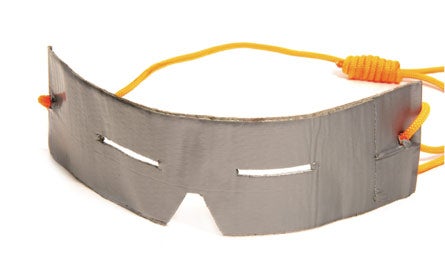Troubleshoot This: Snowblind

'Watch the how-to video for making these emergency goggles. (by A. Bydlon)'
» Ease the pain.
Snow blindness is a result of sunburned corneas, and mild cases manifest as stinging and weeping. Severe cases are excruciating and can swell eyes shut. If you think you’re a victim, “the best thing to do is to close your eyes,” says Dr. Gavin Francis, an Antarctic expedition doctor and author of Empire Antarctica ($27; counterpointpress .com). Cover eyelids with moist gauze to cool the tissue and help minimize eye movement. Take a painkiller like ibuprofen or codeine, and wait until the pain subsides. Most cases selfheal within 72 hours.
» Avoid anesthetic eye drops. They numb the eye, “making it vulnerable to further injury without you even realizing it,” says Francis. Don’t rub eyes in pain, or ones that are numbed.
» If possible, stay put. Ideally, don’t travel until you recover. If you must move, hike at dawn or dusk, in shaded forests, and/or have a friend lead you with your eyes closed. If pain persists, consult a doctor to rule out or prevent permanent vision loss or eye damage.
PREVENT IT
» Wear dark lenses. Without protection, “as little as half an hour of sun bouncing off the snow may cause burning,” says Francis. Wear wraparounds with a VLT (visible light transmission) of 5 to 15 percent—even on cloudy days. Use ventilated styles and anti-fog wipes to avoid lifting glasses repeatedly.
» Forgot or lost your shades? Get off the snow; it reflects eight times more UV radiation than grass and soil. Rub campfire ash below your eyes, NFL-style, to reduce glare.
//